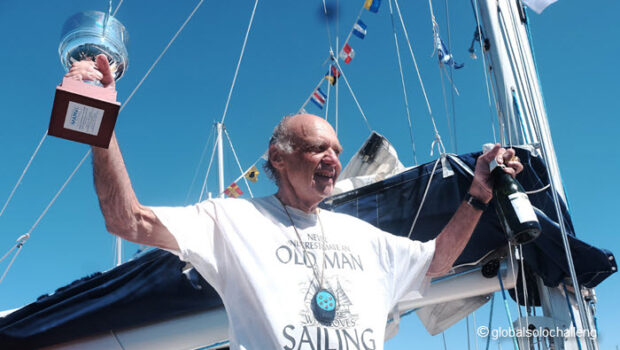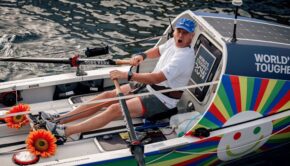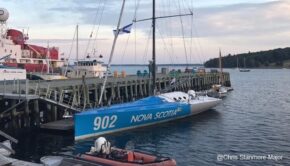Final finisher for Global Solo Challenge
Published on July 8th, 2024
by Marco Nannini, Global Solo Challenge
When Louis Robein sailed into A Coruna, clean-shaven and relaxed, it was easy to mistake him for a sailor returning from a gentle Sunday sail. Wearing a t-shirt that read “Never underestimate an old man who likes sailing,” he was, in fact, completing his incredible circumnavigation of the globe. It took him 277 days and 5 hours since his departure on September 30th last year.
At 16:32 local time on July 3rd, Louis Robein crossed the Spanish finish line of the 2023-24 Global Solo Challenge, solo and round-the-world by the three great capes, taking seventh place in one of the most epic and inspiring voyages of the event. As the final competitor, he inspired the public and won the hearts of thousands with his incredible determination and tenacity, overcoming numerous setbacks and challenges.
Sailing on a production X-37, a small cruiser-racer just over 11 meters in length, the smallest boat to complete the race, Louis had a modest budget, relying solely on his pension. What he lacked in financial means, he compensated with ingenuity, patience, resolve, and strength of character. During the early phases of his circumnavigation, he tackled various problems one by one with the means available on board.
In one incident, his steering wheel tower was knocked down, and he patiently laminated it back into position to regain use of the wheel. His hydrogenerator supports proved less than perfect, requiring repeated attention to avoid a blackout. His autopilot also gave him problems, but each time, Louis found a solution. As he navigated the roaring southern seas, he shared short, often humorous blogs that revealed a quiet and resourceful person who never let difficulties bring him down.
Each milestone of his navigation was celebrated with one of eight bottles of top-quality French wine he had brought. Sailing in the harsh conditions of the roaring forties took its toll on the equipment, especially his electrics and means of charging, leading to an inevitable stopover in Hobart for essential repairs. The situation deteriorated further in the Indian Ocean, just after Cape Leeuwin, Australia, when he experienced a total blackout.
For nearly a week at the end of January, as he was approaching the half-way mark of the circumnavigation, Louis alternated times at the helm with letting the boat drift while heaving-to, as his only way to try to reach Tasmania. His race against the clock required reaching Hobart and restarting before the second week of February to avoid disqualification. Boats participating in the event could only restart if still in a reasonable position to reach Cape Horn by the end of the Austral summer, due to safety concerns as the southern seas become increasingly dangerous with autumn.
The Global Solo Challenge saw several competitors facing extreme challenges that led to their retirement. Louis’ achievement was even more remarkable against this backdrop. After essential repairs in Hobart, made possible by a fundraiser set up by friends, he set off on February 9th for Cape Horn. Initially, all systems worked, but when still weeks away from rounding the cape, new technical issues left Louis without an autopilot and limited to steering the boat with his emergency tiller.
After sailing more than 21,500 miles, including 1,500 miles without an autopilot in the treacherous South Pacific, Louis celebrated rounding Cape Horn on April 5th. As he headed to Ushuaia for rest and repairs, the final stretch before rounding was a test of perseverance, nursing the boat day after day, helming with four layers of gloves in freezing temperatures. Nearing the Chilean coast, a shroud failure added to his challenges, but he miraculously avoided dismasting.
In the uninhabited, moonless night near Bahía Aguirre, fatigue led Louis to mistakenly enter the bay, running aground. A tugboat eventually freed him, and the Argentine Navy towed him to Ushuaia, where he began repairs. Friends started a fundraiser to cover the towing bill, and the camaraderie and friendship born during the event turned into a safety net. Donations poured in as his humble journey inspired many.
Louis left Ushuaia on April 6th with 7,000 miles left to the finish line. Despite warnings about the South Atlantic’s autumn risks, he continued. After three more months, he reached A Coruna, having steered with an elastic shock cord for the final eight days due to slow speeds near the Azores rendering the hydrogenerator useless and insufficient fuel reserves to charge batteries for the autopilot.
His journey showcased the power of grit and determination. His limited budget led to many difficulties, but he inspired everyone that followed his journey with his humility, positivity, and calm persistence. Louis embodies the Corinthian spirit of the Global Solo Challenge with a humanity that must be safeguarded to keep the event inclusive and free from elitism.
With his arrival, the first edition of the Global Solo Challenge concludes, and entries for the 2027-28 edition are open. Many skippers are already preparing their campaigns, with six entries confirmed and several dozen serious candidates showing interest.
I also thank the incredible public following the Global Solo Challenge, whose support made it possible for Louis to finish his journey. He expressed his gratitude for the help he received, and although he did not ask for additional help, I cheekily remind you of the link to his fundraiser. Perhaps we can help him replenish his wine selection to celebrate his achievement.
Race details – Entry list – Start times – Tracking
The inaugural Global Solo Challenge 2023-24 sought to be a budget-friendly solo, non-stop race around the world. Using a pursuit format for the 2023-24 race, 20 entrants from 34 to 70 feet had start times between August 26 to January 6 from A Coruña, Spain, with the first boat to return deemed the winner.










 We’ll keep your information safe.
We’ll keep your information safe.